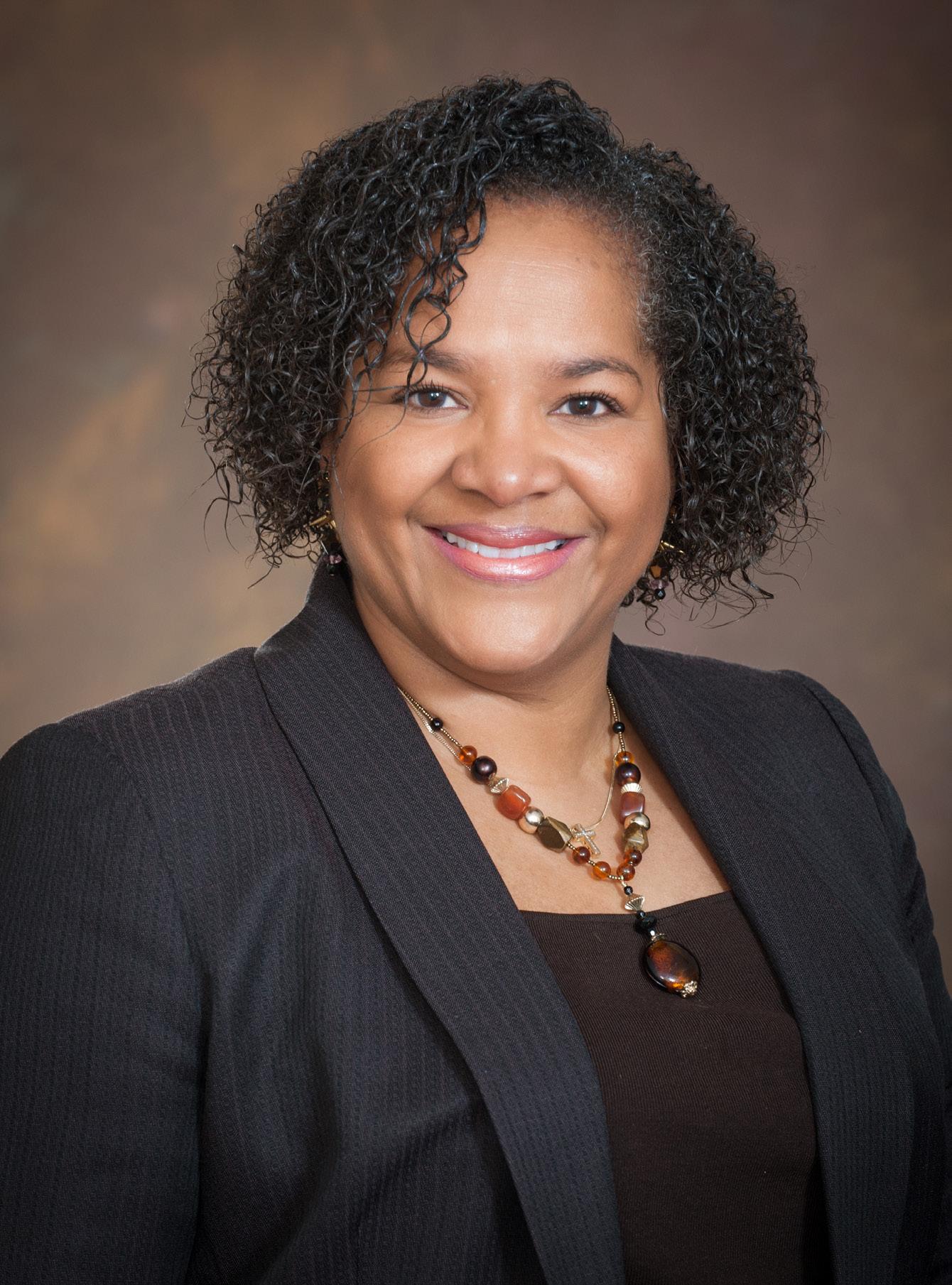CELEBRATING BLACK HISTORY MONTH



We are inspired by your leadership and thank you for your dedication to the field of public health. The work that you are doing is shaping a better tomorrow for Flint and beyond. To be included in this collection of Black History Month voices, we invite faculty, community partners, staff, and alumni to submit a short bio and headshot to Jill Vondrasek at vondras4@msu.edu with the following information:
• Name, degrees/credentials, and job title


• 100-130 word bio
• Headshot
Michigan State is addressing the social determinants of health alongside the Flint community in the areas of health disparities, chronic disease, and behavioral health. Below are highlights of the expertise in action of our public health leaders featured in this digital booklet:

• Flint water crisis response and resources
• Public health education and workforce development
• Culturally appropriate family health history tools
• Racism as a public health crisis
• Depression and suicide risk reduction
• Violence prevention and support
• Maternal and child health
• Breastfeeding
• Mental health
• Vaccine promotion
• Global public health
• Infectious disease
• And more TOGETHER, WE STAND FOR HEALTH JUSTICE.
LEADING GROWTH IN PUBLIC HEALTH
THROUGH MPH ACCREDITATION AND DEPARTMENTAL STATUS

Over the past seven years, MSU has brought in more than $115M in federal research funding. On December 16, 2022, the Board of Trustees approved the creation of MSU’s first fully philanthropically named department - the Charles Stewart Mott Department of Public Health.
To reduce the barrier to graduate education, he created the first full-tuition MSU Master of Public Health Flint Scholarship and is working to provide more scholarship opportunities.
Dr. McCullough has been instrumental in leading MSU’s growth in public health and achieving departmental status. As director of the Master of Public Health Program, he increases the acumen of all students as expert users of public health information to improve health as future Spartans in Public Health. With an alumni base of more than 700, he has successfully led the accreditation process of the Council on Education for Public Health (CEPH). Having met all 35 criteria, the independent accrediting agency for U.S. schools and public health programs acted to approve the Michigan State University Online Master of Public Health Program for accreditation at the CEPH Board of Councilors meeting on June 1 – 3, 2022.
McCullough is focused on addressing the social determinants of health, reducing health disparities, and advancing policies and interventions that eliminate structural racism in health care. His research interests include how communications can help advance under-served communities.
• On the Man Up Man Down project, he worked to increase life expectancy of Black men with a diabetes self-care and social support intervention.
• As a Co-PI, he is a mentor in the federally funded Research to Reduce Disparities Program to create a trans-disciplinary bridge between medicine and public health. The program aims to create physician/ research scientists to address the role of race, ethnicity, gender, and implicit/explicit bias in medicine.
• He directed three annual dental health screening events for Flint in collaboration with community partners.

Dr. Canady is highly influential in broadening the discussion of health equity and social justice while serving on numerous national boards, review panels, and advisory groups. She serves on the Robert Wood Johnson Foundation County Health Rankings Scientific Advisory Group and is president of the Boards of the National Network of Public Health Institutes and the Council for Black Health. She was appointed by Gov. Whitmer to the Michigan Coronavirus Task Force for Racial Disparities and is a co-lead for their Centering Equity Work-group. Canady developed a research trajectory in health disparities and health inequities, emphasizing the social context of pregnancy experiences and outcomes in African American women. She applies this expertise in projects such as Advancing Birth Equity through Systems Change and as a member of the Advisory Board of Birth Detroit, a birth center led by Black women.
Dr. Hailemariam is a mental health epidemiologist, a researcher, and advocate for equitable mental health care globally.
Her research interests include mental health care for under-served populations in low-resource settings including within high-income countries. Her research focuses on developing lay provider or peer provider-delivered mental health interventions to improve access to mental health services, improve functioning, and reduce mental health symptoms. Her research is guided by understanding barriers to mental health care that are disproportionately experienced by under-served populations including perinatal women, rural residents, and justice-involved individuals in low-resource settings.

Kenyetta Dotson is a community organizer, encouraging positive systemic change throughout the City of Flint, Genesee County, and beyond. She has over 30 years of community development experience, serving as an advocate for youth, families, and survivors of violence. She founded a local non-profit organization committed to eliminating the culture and tolerance for violence.
Dotson works closely with youth, parents, organizations, and so many more to instill hope, provoke forward thinking, and apply solution-driven action to address community needs. Kenyetta has devoted her life to aide youth, families, marginalized groups and communities who have experienced financial and social hardships, by helping to restore independence, self-sufficiency, and leadership skills. She works diligently to promote awareness, improve living conditions, and create opportunities and access to the most needed services for families with barriers and immense needs.

Linda Cornish holds a dual appointment as the operations manager and department administrator for the Charles Stewart Mott Department of Public Health in Flint, MI.
Cornish became the first administrative personnel hired for the role of operations and facility manager in 2014. She plays an integral role in expanding the MSU College of Human Medicine reach. Cornish is responsible for aligning policies with main campus guidelines and procedures. She implements systems for operational success and process improvement; maintains the aesthetics of the facility; manages grounds maintenance; and builds relationships with community partners and the property management company. In 2022, she received the highest staff honor at MSU, the Jack Breslin Distinguished Staff Award for excellence in job performance, supportive attitude, and overall contributions.

IMPLEMENTING SYSTEMS OF OPERATIONAL SUCCESS
Dr. Key is a classically trained health disparities researcher. He is an expert in building equitable relationships between community and academic partners for health research and elevating community-identified health priorities. His research focuses on marginalized populations across the lifespan. He has worked on national, regional, and local levels throughout his career to translate the resources of government, research partnerships, and foundations into practical support.
Key is founder of the Community Ethics Review Board, a component of the Community Based Organization Partners where community members conduct ethical reviews of proposed research projects, ensure no harm is done on a community level, and to assess mutual benefit. Key is a 2016 Fellow of the Robert Wood Johnson Foundation Culture of Health Leaders Program and serves on the national landscape as a Health Equity Scholar. In 2020, he authored a resolution Declaring Racism as a Public Health Crisis and has spearheaded initiatives locally, regionally, and nationally.

Dr. McCoy White is an academic research specialist coordinating community-partnered anti-racism interventions. She supports Flint community members on Dr. Jennifer Johnson’s and Dr. Steve Ondersma’s teams.
She works on the Maternal Health Multilevel Intervention for Racial Equity (MIRACLE) study, an NIH-funded multilevel intervention study on African American maternal morbidity and mortality in Genesee and Kent Counties.
McCoy White facilitates testing of vaccine promotion content in ongoing implementation contexts. She is developing a series of computer-delivered messages, videos, and micro-interventions designed to promote vaccination of pregnant patients for COVID-19, and newborn infants following CDC and AAP guidelines.

Dr. Shipp is a registered dietitian nutritionist. She is engaged in several research projects with the overarching goal of improving maternal and child health equity, specifically breastfeeding related disparities. Her research interests also spans diet and nutrition-related health disparities impacting vulnerable populations, food access and food choice in under-served areas, and community nutrition.
Shipp recently completed an NIH funded postdoctoral fellowship funded through Environmental Influences and Child Health Outcomes, ECHO program, 2020-2022. Under her supplement she received training at MSU, focused on perinatal epidemiology and design of intervention studies. She is passionate about reducing breastfeeding disparities, especially within the African American community.
Shipp served as the chair of the statewide breastfeeding coalition (2019-2022) and continues to serve as a board member with Michigan Breastfeeding Network to support breastfeeding families within Michigan.

Dr. Smart is an epidemiologist and director of the College of Human Medicine Leadership in Medicine for the Under-served certificate program. She also serves the African Studies Center, the Institute for Global Health, and the Master of Public Health Program. She is co-director of the Research to Reduce Disparities in Disease (R2D2) program, an NIH-funded, clinical research training program.
Smart has led and designed experiential education abroad programs in Uganda, South Africa, Belize, and the United States. She does alcohol policy evaluation and monitoring work in Uganda, providing the evidence needed to inform policy interventions, enforcement strategies, and campaigns for compliance uptake. In 2020, she was named a Michigan Center for Urban African American Aging Research scientist.


Dr. Sneed provides instruction on Community Engagement in Public Health Practice within the Master of Public Health Program. Drawing on her experience as a community-engaged researcher, Sneed helps students to understand why including community voices in public health programming is crucial for advancing health equity, especially in marginalized communities. Students in her course learn about both theoretical and practical considerations associated with community-engaged programming and are challenged to develop community-engaged projects that serve the communities where they live and work.
PROVIDING
FREE PROFESSIONAL DEVELOPMENT
Dr. Satti is an expert in parasitic and infectious diseases. His research focus has been on diseases common in the tropics – such as schistosomiasis, second only to malaria as the most devastating parasitic disease. And onchocerciasis, also known as river blindness. In the United States, he studies locally transmitted diseases, such as pinworms, Lyme disease, West Nile virus, and giardiaa waterborne infection that causes abdominal cramps, bloating, nausea, and diarrhea in humans and infects dogs. His research has found more than 70 percent of shelter dogs are infected. In the Master of Public Health program and the College of Veterinary Medicine, he has taught numerous classes, from parasitic diseases to foodborne parasites and their impact on food safety, field methodology for investigating parasitic diseases, and more.
Satti spent many years researching and teaching in Sudan, the Cayman Islands, Denmark, Switzerland, Saudi Arabia, and England. He has published many studies and presentations on infectious diseases at international conferences.


